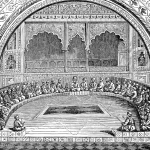While I often like to alternate sources between weeks, this was one I’ve been wanting to use for sometime:
We may indeed do so announcing with Karl Barth in tones of loud conviction that Christianity is not a religion, or, with Kierkegaard, that it is not a philosophy, or with Bultmann, that it is not a mythology. But God would not have become human if he had not come into positive inner contact with these forms of thought and experience. The evidence for this contact and this contamination is provided by the Bible itself, which attains its final and (for the Christian) binding form precisely in the great age of religion and syncretism. Those who want to ‘purify’ the Bible of religion, philosophy and myth want to be more biblical than the Bible, more Christian than Christ. What is invariably left after these supposed exorcisms is a pitifully abstract affair, that seeks to hide its wretchedness by exalting the slogan of ‘holy poverty’, the ‘absolute seriousness’ of its own impoverishment, as the unum necessarium, latching on to the ‘Word’ in one way or another, as if this Word, ascending to the Father, had not sent forth the Holy Spirit upon Church and world.
— Hans Urs von Balthasar, The Glory of the Lord IV: The Realm of Metaphysics in Antiquity. trans. Brian McNeil C.R.V., Andrew Louth, John Saward, Rowan Williams and Oliver Davies. Ed. John Riches (San Franciso: Ignatius Press, 1989), 243.
















